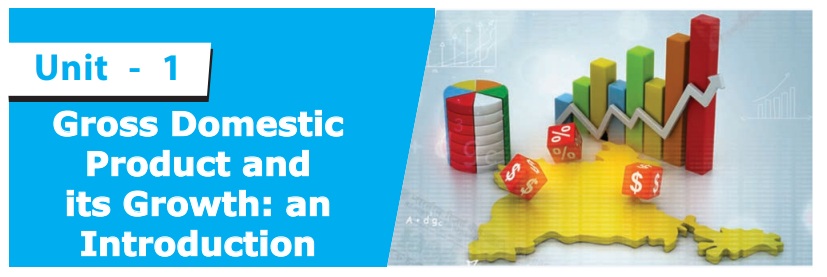Economics - Gross Domestic Product and its Growth: an Introduction | 10th Social Science : Economics : Chapter 1 : Gross Domestic Product and its Growth: an Introduction
Chapter: 10th Social Science : Economics : Chapter 1 : Gross Domestic Product and its Growth: an Introduction
Gross Domestic Product and its Growth: an Introduction
Gross Domestic Product and its Growth: an Introduction

Learning Objectives
• To know about the meaning of Gross Domestic Product
• To Understand the basic various measures of National Income
• To Understand the composition of GDP
• To know the contribution of different sectors in GDP
• To know the economic growth and development and its
differences
• To know about Development path based on GDP And Employment
• To understand the growth of GDP and Economic Policies
Introduction
To understand how the GDP tells us how India is
doing, you should understand what GDP is.
Imagine what happens in a hotel. You place an order
for two Idlis and a cup of tea. Someone makes the idlis and tea and someone
else serves you.
Idlis and tea are produced . These are tangible,
physical things you can touch and feel. Economists call such tangible items
“goods”. These goods are not free but have to pay or to be paid.
Though
you don’t realise it in addition to these tangible things called goods,
something else is being produced : the work done by the cooks and the people
who serve the food. The activity of cooking and serving is not something you
can feel and touch. Such activities are not tangible but are nevertheless
crucial for you to enjoy the food. Economists call such activity “services”.
What
happens everyday in a hotel at nation wide: goods and services are produced and
paid for and this what the GDP measures.

DEFINITION OF GDP
The GDP
is the market value of all the final goods and services produced in the country
during a time period.
GDP=C+I+G+(X−M)
C =
Consumption I = Investment
G =
Government Expenditure
( X − M)
= X = Exports − M = Imports Every part of the definition is important.
Goods and services: As you
know by now, goods are tangible
items while services are activities which are intangible .
Market value: This is
the price at which goods and
services are sold in the market.
Final goods and services: Economists Tyler Cowen and Alex Tabarrok say that
“final goods and services” are the goods and services which will be used or
consumed. The goods and services which will be used for producing other goods
and services and will form a part of the goods and services produced are called
“intermediate goods”.
Only the
final goods are included in the GDP. Intermediate goods are not counted in
calculating the GDP because their value is included in the final goods. So if
the intermediate goods are included in the GDP it will result in what is called
“double counting”.
For
example, a cup of tea bought in a hotel is a final good because it is consumed
and does not form a part of producing something else. So the market value of
the cup of tea, being a final good, is included in the GDP. Sugar which is
mixed in the tea is an intermediate good because it is used in making tea and
forms a part of the tea served. Suppose the tea is priced ₹ 10 a cup, of which the value of
sugar used is ₹ 2. So the
price of the cup of tea includes the
₹ 2 price
of the spoon of sugar. If this value of
sugar is
included in the GDP , it will be counted twice: as a spoon of sugar and again
as a part of the cup of tea. This is “double counting” and to avoid it the
intermediate goods like sugar are excluded from GDP.
Related Topics